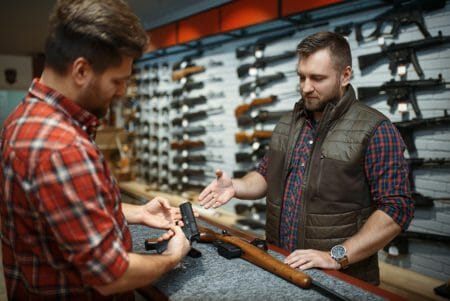A Connecticut judge has allowed a lawsuit targeting Ruger over the 2021 King Soopers mass shooting to move forward — a ruling that stands in sharp contrast to the Supreme Court’s recent unanimous decision strengthening the Protection of Lawful Commerce in Arms Act (PLCAA).
The case, Stanisic v. Ruger, centers on the Boulder, Colorado, attack in which the murderer used a Ruger AR-556 pistol equipped with a brace. Ten people were killed, including shoppers, workers, and a Boulder police officer. The shooter is already serving multiple life sentences. Now, some victims’ families are pursuing Ruger, claiming the company’s marketing contributed to the crime.
Their argument persuaded a local Connecticut Superior Court Judge W. Glenn Pierson enough to survive Ruger’s effort to have the case dismissed early. “While unquestionably broad, the immunity conferred by the PLCAA on firearms manufacturers and sellers is not absolute,” Judge Pierson wrote.
That one sentence sets the stage for a long, expensive discovery fight — one Ruger had hoped to avoid.
A Different Result Than the U.S. Supreme Court’s Mexico v. Smith & Wesson Decision
The ruling comes just months after the U.S. Supreme Court unanimously threw out Mexico’s attempt to sue Smith & Wesson and other manufacturers. In that case, Justice Elena Kagan wrote plainly that the allegations “cannot satisfy the demands of the statute’s predicate exception.” She emphasized that manufacturers cannot be held responsible for “a third party’s criminal use” of a lawful product.
Kagan also pushed back against the argument that producing popular rifles somehow proves malicious intent. “The AR-15 is the most popular rifle in the country,” she wrote, adding that criminal misuse does not transform lawful manufacturing into aiding cartels.
Judge Pierson’s ruling heads in the opposite direction. While he acknowledged the difficulty plaintiffs face, he found their marketing-based claims specific enough to continue.
He even echoed the Connecticut Supreme Court’s reasoning from the Soto (Sandy Hook) case, noting that proving a causal link “may prove to be a Herculean task,” but is not grounds for dismissal at this early stage.
Why the Plaintiffs [Everytown] Say Ruger Is Liable
The families argue Ruger marketed the AR-556 pistol in a way that supposedly encouraged someone like the Boulder shooter to pick it.
Their claims, as summarized by Judge Pierson, include:
- Ruger “sought to profit from consumer demand for short-barreled rifles outside applicable regulatory requirements.”
- The company designed the AR-556 pistol to “increase concealability and maneuverability,” combining features of a rifle with “tactical advantages of smaller weapons.”
- Ruger allegedly promoted the firearm’s “assaultive and militaristic nature.”
- This conduct supposedly “inspired or induced” the killer to select the AR-556 pistol.
The plaintiffs also claim Ruger violated Connecticut’s Unfair Trade Practices Act (CUTPA) and federal gun laws — specifically the Gun Control Act and the National Firearms Act — based on the ongoing regulatory debate over pistol braces.
Ruger rightfully denies violating any laws.
Pierson ruled that these allegations, if assumed true at this stage, fit into PLCAA’s “predicate exception,” which allows suits if a gunmaker knowingly breaks a state or federal firearms-related law. “Both the GCA and NFA expressly regulate commerce in firearms,” he wrote, and therefore qualify.
A Clear Warning: Discovery Is Coming
Ruger attempted to shut down the lawsuit before discovery, arguing the claims were too vague, too sweeping, or legally improper. The judge disagreed.
He found the plaintiffs had “alleged facts sufficient to support the element of causation.” As a result, Ruger now faces the most punishing part of civil litigation: discovery — subpoenas, emails, marketing documents, depositions, and fishing expeditions conducted by opposing lawyers.
Everytown Law, which represents some of the plaintiffs, celebrated the ruling. “It’s an important step forward on the path to accountability,” said Eric Tirschwell, its executive director. He argued that Ruger “put profits over safety” and that the alleged violations “paved the way for the devastatingly tragic outcome.”
The Bigger Backdrop: Blue States Testing PLCAA
Colorado gun-control advocates have tried for years to push new restrictions following the 2021 attack. Boulder passed a battery of gun laws after the shooting, including an age-21 purchase rule, a 10-day waiting period, and an “assault weapons” ban — though several measures remain tied up in court.
Gun-rights groups point out these laws would not have stopped the Boulder shooting anyway, since the murderer legally bought his firearm in a different city. As Rocky Mountain Gun Owners’ Taylor Rhodes put it in a previous interview, “The path that we’re going with passing anti-gun legislation is clearly not making our community safer.”
The current Ruger lawsuit falls into the same strategy seen in Connecticut, New York, New Jersey, and California: pass state-level “consumer protection” laws, create broad theories of “unfair marketing,” and then use them to sue manufacturers despite PLCAA.
Judge Pierson’s decision does not rule Ruger liable — it only allows the case to proceed. The plaintiffs still must prove Ruger’s marketing caused a criminal attack by a third party, a burden even the judge admits is steep.
What Happens Next
Unless Ruger successfully appeals, the case enters full discovery. That means:
- Ruger executives and employees may be questioned under oath.
- Internal marketing materials could be subpoenaed.
- The court may scrutinize the company’s historical advertising and firearm design choices.
For gun-rights observers, the concern is straightforward: if plaintiffs can survive dismissal simply by claiming a company “inspired” a criminal through lawful marketing, it risks turning PLCAA into a hollow protection.
Still, the legal battle is far from over. Discovery will likely take months, followed by new motions — and possibly an appeal to higher courts.
For now, though, the case that should have ended at the starting line under PLCAA will move ahead, and Ruger is back in court defending the same industry shield the Supreme Court reaffirmed just months ago.
We are in dangerous times! We are SO CLOSE to our final funding goals! With your help we can make it!
Protection of Lawful Commerce in Arms Act (PLCAA): Why Are Anti-Gunners so Desperate to Repeal it?
Mexico Lost Big at SCOTUS & Now Pressing Ahead with Frivolous Lawsuit Against Small Gun Shops






Child, Please!
If they can ignore the whole freaking Second Amendment, what is at all shocking when they ignore the piddly little PLCAA?
In order to hold Ruger liable due to its marketing, the plaintiffs need to establish a positive link between that marketing and the perpetrator of the King Sooper murders. This means proving the shooter not only saw the marketing but was influenced to buy the gun by it. If the shooter based his choice on what he saw on display at the gun store or was influenced by a salesperson’s recommendation, Ruger is off the hook because those break the link between the marketing and the purchase. As would be expected, Everytown for Gun Control is way off base. At… Read more »
. “While unquestionably broad, the immunity conferred by the PLCAA on firearms manufacturers and sellers is not absolute,” Judge Pierson wrote.
It should be absolute. More corrupt Judges.
the process is the punishment.
the time and money this is going to cost ruger is going to be enormous. like someone else commented, death by a thousand cuts.
anyone with a functioning brain knows that the plcaa covers ruger in this case. should be a no-brainer, but we are dealing with progs.